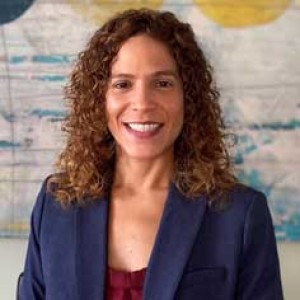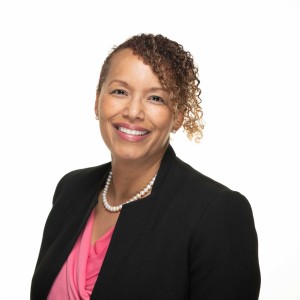The Fix
The Fix is a podcast that shares stories of women and men who are taking action and innovating to advance equality in the workplace and beyond.
The Fix is a podcast that shares stories of women and men who are taking action and innovating to advance equality in the workplace and beyond.
Episodes

Wednesday Jun 09, 2021
Great minds don't all think alike: Rob Austin
Wednesday Jun 09, 2021
Wednesday Jun 09, 2021
Despite the saying, the thing that makes great minds so great is they don't all think alike. Increasingly companies need people who can solve complex problems, innovate and create in new ways precisely because they don’t view the world in the same way as many others do.
The term “neurodivergent” describes a person who thinks differently to the dominant social norm - or “neurotypical” person - because of individual differences related to a cognitive condition such as Autism, dyslexia, dyspraxia or ADHD.
That's why companies like SAP, Microsoft and Google have invested in hiring people who are Autistic or otherwise neurodivergent.
But not all workplaces value or nurture different ways of thinking and within the 20% of the global population which is neurodivergent, it’s estimated the unemployment rate is over 80% .
If there is one thing that the pandemic has taught us it’s that work accommodations can be made with great success. Businesses need neurodiversity to outcompete their competitors. Making targeted accommodations to create more inclusive work environments for people who are neurodivergent can unlock one of the world’s largest untapped talent pools.
In an article for HBR, Rob Austin, professor of information systems at Ivey Business School in Canada who studies neurodiversity in the workplace, shares that although many companies are just beginning to realize the benefits of neurodiversity, SAP’s program, which is four years old, is already paying off in terms of increased productivity gains, quality improvement, boosts in innovative capabilities, and broad increases in employee engagement.
On today's episode Rob joins us to unpack what neurodiversity is and tell us why organisations need neurodivergent people now more than ever.

Wednesday Jun 02, 2021
Welcome To The Post Pandemic Workplace - Anna Meller
Wednesday Jun 02, 2021
Wednesday Jun 02, 2021
As countries begin to ease lock down restrictions, a lot of employees want to know what will the post-pandemic workplace look like? For many office workers remote work is here to stay, whether they like it or not. Companies like Twitter and Dropbox, have moved to almost complete remote working with no signs that this will change.
According to LinkedIn’s Workforce Confidence Index, roughly half of U.S. professionals believe their companies will allow them to telecommute at least part of the time after the pandemic. That percentage is even higher in industries including tech (73%), finance (67%) and media (59%), that see flexible work as the future.
While the pandemic has shown us that flexible working is possible, surviving and thriving are not the same thing. While working from home can reduce company costs, and increase employee productivity, it also increases employee stress as boundaries become difficult to manage, and there is pressure to always be on.
As we enter this new phase of working life it is important to understand what the costs are especially when it comes to inclusion and wellbeing.
On this episode we are joined by hybrid working expert, Anna Meller who will unpack what hybrid working is. What jobs can be done from home, how we can set boundaries with our workplaces, and what can we do to prepare for the post pandemic workplace.

Wednesday May 26, 2021
Heard of the Gender Pain Gap? - Dr Jen Peña
Wednesday May 26, 2021
Wednesday May 26, 2021
It is not surprising there is a gender pain gap given the distinct under-researching of womens’ health and the implications this has for medical education and training. In the book Invisible Women, Caroline Criado-Perez points out that it has been historically assumed that there wasn’t anything fundamentally different between male and female bodies other than size and reproductive function - so for years medical education has been focused on a male “norm”.
The doctor-patient relationship is a fiduciary one which means it is based on mutual trust and respect being a core component of good care. The more barriers there are to understanding each other, the greater the risk to quality of care. But many women do face significant barriers as a result of the gender pain gap. These include a lack of understanding of female specific health concerns and a lack of awareness of sex-based differences in the way non-gendered health issues, such as heart attacks, are experienced. Consequently women are more likely to be misdiagnosed or poorly cared for, which detrimentally impacts their health, wellbeing and life expectancy. The impacts can be disastrous. A 2016 study found that women were 50% more likely to be misdiagnosed following a heart attack.
On today’s episode we will be speaking with Dr. Jennifer Peña who is former physician to the White House Medical Unit, internal medicine doctor, Army vet, and a trailblazer in digital and telehealth. Dr. Peña will unpack the issue of gender inequality in medicine and how we can tackle this.

Wednesday May 19, 2021
The Future of Leadership - Leah Weiss
Wednesday May 19, 2021
Wednesday May 19, 2021
Over the next five to ten years, jobs will change due to technological advancements like artificial intelligence, robotics, the Internet of Things, 3-D printing, and nanotechnology. While these advancements will create a range of new jobs in industries yet to be created, many of today’s jobs will still exist, they will just look a little different and probably involve working with machines. Consider the field of medicine, where medical doctors are primarily responsible for correctly diagnosing and treating patients.
In the future, it may be algorithms making these diagnoses with remarkable accuracy. Computers could be used to make recommendations about the best treatment. Artificial Intelligence could replace pharmacists, and, in some cases, robots could even carry out surgery. Doctors won’t disappear, but they won’t diagnose or prescribe medicine in the same way they do today. Their role will change as they will need to comfort and manage patients to a greater extent. Just like this example, in the immediate future, advancements in technology won’t necessarily replace all jobs, but it will alter the way most of us work.
The parts of our jobs that are routine, administrative, and repetitive will likely be replaced by technology. According to the consulting firm McKinsey, for 60 percent of all jobs at least one-third of the activities can be automated. Like doctors, employees will be freed up to undertake new tasks in new ways, which will require new skills.
In this podcast we are joined by Dr. Leah Weiss who is a Stanford Graduate School of Business lecturer. She has focused her studies on compassionate leadership, and the positive effect it has on organizations. In this episode Leah will unpack what compassionate leadership is, how we can develop it and why it really is the future of leadership.

Wednesday May 12, 2021
How To Manage Microagressions - Heather Younger
Wednesday May 12, 2021
Wednesday May 12, 2021
Psychological safety, a term coined and defined by Harvard Business School professor Amy Edmondson, people feel psychologically safe at work when they believe that they can be themselves at work and they won't be punished or humiliated for sharing their identity, speaking up with ideas, questions, concerns or mistakes.
In short, it is how comfortable individuals are with being themselves, taking risks and being vulnerable with their team. Having a diverse workforce most certainly does not guarantee that everyone in your organization feel comfortable or valued for who they are.
One of the quickest ways to erode psychological safety is microagressions, which are the indirect or unintentional expressions of racism, sexism, ageism, or ableism. Like asking to touch a Black colleagues hair, pushing a persons wheelchair without asking or telling women to smile. These are all forms of discrimination that come out in seemingly innocuous comments by people who might be completely unaware.
It is not the one off comment that has the greatest impact, rather it is the compounded effect day in and day out of working in an environment where you have to be on alert for where the next comment might be coming from. This has the greatest detrimental impact on a persons mental and emotional wellbeing because it sends the message that they do not belong.
Given the widespread nature of microagressions, on today's episode Heather Younger, international speaker, consultant, adjunct organizational leadership professor and author of The Art of Caring Leadership shares how we can manage microagressions when they happen and build a workplace where people can be themselves.

Wednesday May 05, 2021
Care Can't Wait - Tina Tchen
Wednesday May 05, 2021
Wednesday May 05, 2021
Did you know that in the United States in 2020 over 2 million women left the workforce, and in December 140,000 jobs were lost and every one of those was to a woman. This is an issue which disproportionately impacts Black and Latina women, who often work in roles that lack paid sick leave and the ability to work from home. As covid19 hit, mothers were forced to stay at home to care for their children.
According to UN Women, the global organisation responsible for advancing gender equality, before the crisis started, women did nearly 3 times as much unpaid care and domestic work as men. Social distancing measures, school closures and overburdened health systems have put an increased demand on women and girls to cater to the basic survival needs of the family and care for the sick and the elderly. Emerging evidence from UN Women’s rapid gender assessment surveys demonstrates that the disproportionate share of unpaid care work is still falling on women’s shoulders during the pandemic; in fact, they report an increase in unpaid care, often while managing paid work.
This is a global issue. In rural contexts, women are generally responsible for gathering water and firewood. This constrains their ability to carry out paid work, particularly when jobs cannot be carried out remotely. In urban areas, women are having to care for children at home while holding down a full time remote job. While men have spent more time at home, and in some cases cared for their children or dependents too, women are still undertaking the majority of domestic duties at home.
Tina Tchen, the president and CEO of TIME’S UP Now and the TIME’S UP Foundation, joins us to share why care can’t wait. Tina is a former assistant to President Barack Obama, executive director of the White House Council on Women and Girls, and chief of staff to First Lady Michelle Obama. Tina has worked to advance gender equality, particularly for working women. Here Tina shares how the care crisis is playing out in the United States.

Wednesday Apr 28, 2021
Disability Rights - Kathy Martinez
Wednesday Apr 28, 2021
Wednesday Apr 28, 2021
The social model of disability, which is a way of viewing the world developed by people with different mental and physical abilities, is the idea that society disables physically impaired people by assuming everyone experiences life in the same way. By not accounting for people’s differences, one of which is physical impairments, we inadvertently exclude people from fully participating in day to day activities.
This can include structural barriers, like not having access to handicap accessible toilets, or social barriers, like holding negative attitudes and behaviors toward people with impairments.
When it comes to disability rights, the shift that each of us can make is from viewing people as disabled by their differences to being disabled by the barriers they encounter in society. By viewing disability in this way, we can begin to tackle ableism and start to identify all the barriers that prevent people with impairments from having equal opportunities in life.
Over 50 million Americans live with disabilities, and the disability rights movement is focused on securing equal rights and equal opportunities for people with different physical and mental abilities.
In today's episode we are joined by Kathy Martinez, an internationally recognized disability rights leader and the President and CEO of Disability Rights Advocates, a United States nonprofit legal center that works to advance disability rights. Kathy is the former SVP, Head of Disability and Accessibility Strategy for Wells Fargo. She was born blind along with her sister, and has been an advocate for people with disabilities for most of her career.
Along with Kathy, we unpack how the disability rights movement is working to remove the institutional, physical, and societal barriers people with disabilities face. We will also share specific actions each of us can take to ensure that we create a society where people with disabilities are free to live their lives like anyone else.

Wednesday Apr 21, 2021
How To Raise Inequality Aware Kids - Mallika Chopra
Wednesday Apr 21, 2021
Wednesday Apr 21, 2021
Did you know that according to UNICEF, babies as young as 6 months old notice physical differences including skin color, and studies show that by the age of 5 children treat people from different racial and ethnic backgrounds differently, favoring some over others.
Inequality is everywhere, there is simply no way to shield children from it. So what can you do? Arm your children with awareness. Ignoring inequality doesn't protect your children from it. When kids are exposed to bias, discrimination and inequality without understanding what is happening, they can feel isolated, lost and unsafe, which negatively impacts their confidence, development and emotional well being.
To arm your children with awareness and understanding of inequality requires getting comfortable talking about difficult topics, like ableism, sexims, racism and classism. The earlier parents start having these discussions the more effective their children will be in dealing with the challenges of inequality that they encounter every day.
In todays episode we are joined by Mallika Chopra, daughter of the well known thought leader, Deepack Chopra. Mallika is a mother, author and public speaker. She has written a series of 'Just Be' books for children to help them tackle difficult topics like body positivity, diversity and inclusion. These include Just Breathe, Just Feel, and Just Be You. Here, she discusses how to arm your children with awareness, and why this is critical to helping the next generation navigate and overcome the inequality that exists in everyday life.


